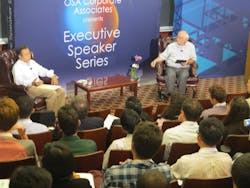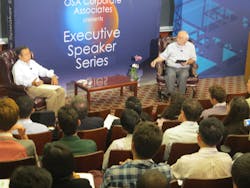I would like to share with you the conversation Hank Gauthier and I had in August when he interviewed me for the OSA Executive Speaker Series, which took place during the inaugural meeting of the Siegman International School on Lasers at Stanford University. The Siegman International School on Lasers is a program co-founded by the OSA Foundation and IPG Photonics to advance the education of 100 graduate students. It will be held each year in a different region of the world.
The OSA Executive Speaker Series presents case studies to provide career-planning ideas. Hank is the former CEO of Coherent and sits on the Board of IPG Photonics. He is one executive whom I deeply respect and admire for having put in place the foundation for Coherent’s sustained growth. I would like to share this discussion with you because the audience—mostly graduate students—was interested and attentive, implying what we said was useful.
Hank began by asking me why I made my career moves: first, to leave a research job to join Newport, a startup company, to take on marketing and sales, and then leaving that company 17 years later after having taken it public. What Hank was driving at was how people make turns in their career paths. That discussion led to what got me interested in business and how I was able to handle management issues with no prior experience or training. And given my business background, he went on to ask for my views on how to lower the risk of starting a business in today’s environment. He ended the interview by discussing career advice to photonics engineers and areas of opportunities in photonics applications.
I wish I could claim that I made my career moves prompted by my foresight to predict the future. I did know I was restless after working two years for an aerospace company, not knowing where my research project or the job would take me. My research project was more or less an extrapolation of the work I did in graduate school, and job advancement was possible but limited. And I had the same feeling when I left Newport five years after taking it public.
Action is better than nonaction
When asked today, I would say, based on my experience: Make a change when work has become routine and you feel restless deep inside knowing that learning and growing have slowed. And to help overcome any doubts, I would add, Action is always better than nonaction. The reality of what you might encounter is never as onerous as the fear of the unknown led you to believe. Sometimes a disruption or a temporary cut in income is unavoidable, but you can chalk that up as the price to get on a new career track or as paying tuition to learn new skills.
I was an idealistic young man and had zero interest in business until a business professor in my first year of graduate school planted a seed by making the point that it takes business and management skills to turn technology into products to benefit society. He encouraged us to read Business Week, Fortune, Forbes, and the Wall Street Journal. He also stimulated our interest by having us invest play money in the stock market. We wound up learning about the businesses we analyzed and those we “invested” in. The amount of knowledge I picked up over the years told me there is a big world out there, which eventually made it easier for me to change career paths.
All my colleagues at Newport were technical and had no prior business experience. Fortunately, most business and management issues in a small business are about relationships that can be addressed with common sense and logical reasoning. For complex issues we turned to our investors and directors for guidance. I also had plenty of mentors along the way, ranging from the advertising graphic designer down the street to the salespeople who called on us. When in doubt, we operated conservatively to minimize risks.
As careers go, picking photonics is a good move because photonics is finding applications in just about every industry. A prerequisite to positioning yourself for opportunities is to become a capable photonics engineer! Companies hire individuals for specific skills to hit the ground running. Also take an interest in business and management early because knowing how managers think provides a context to outperform a pure bench engineer, and that insight also enables you to become a manager in due time.
With that in mind, you wouldn’t want to find a job based solely on salary or fringe benefits, but based on having the opportunity to manage broadly defined projects to learn and grow. At the same time, you want to hone your leadership and people skills to enable you to start your own company if you ever decide to do so.
Golden rule for entrepreneurs
As for golden rules for entrepreneurs, I said, with tongue in cheek, a cardinal rule is to never run out of money because the business is finished without money. This point is actually important because many people believe it is the right thing for an entrepreneur to “take the plunge” with whatever amount of capital he or she can raise. In reality, that’s a trap! The business is finished if you do not have a significant milestone to convince investors to provide you the next round of funding. Having adequate financial backing enables you to overcome setbacks and eventually succeed.
The best way to lower risk is to make sure your value proposition makes business sense. Getting adequate financial backing is absolutely essential; however, that’s easier said than done. PWC MoneyTree reported approximately $10 billion in venture money was invested in the second quarter of 2014, up from the $8 billion invested in the first quarter! The numbers imply a lot of money-chasing deals; a closer examination shows software companies received 50 times more funding than hardware companies, and most of the funding went to late-stage companies. The reality is that it is really tough to raise money to start a photonics company.
My Newport and New Focus experience suggests it is almost risk-free to start a niche business using your expertise to serve a specific need in an industry you know. Capital requirements and product risks are by definition lower and market risk is also minimized because big companies are not likely to go after a niche business. You will get product ideas from customers when you are in business, and you can raise additional capital at a reasonable valuation with your track record.
Based on the point I just made, opportunity is where you can apply your expertise to serve a need. Given that we are at the dawn of personalized medicine, healthcare is what I would pick if only one area of applications opportunity is available. Ease into an area outside of your field by positioning yourself as a service provider, that is, to offer photonics tools to enable biotech experts to implement their applications. You’ll be accepted into the industry with open arms to eventually become an industry insider able to compete on equal footing.
About the Author
Milton Chang
MILTON CHANG of Incubic Management was president of Newport and New Focus. He is currently director of mBio Diagnostics and Aurrion; a trustee of Caltech; a member of the SEC Advisory Committee on Small and Emerging Companies; and serves on advisory boards and mentors entrepreneurs. Chang is a Fellow of IEEE, OSA, and LIA. Direct your business, management, and career questions to him at [email protected], and check out his book Toward Entrepreneurship at www.miltonchang.com.


